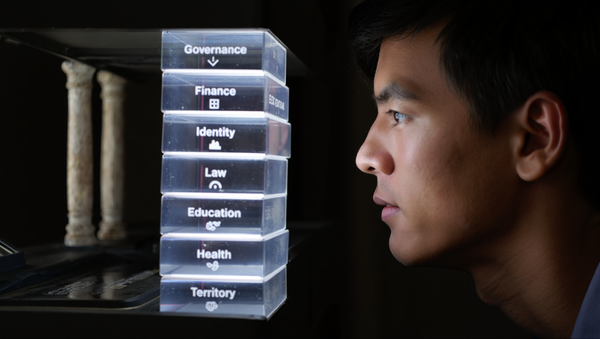Sovereign Individuals, Network States, and the Great Decentralization

A Primer on Sovereignty in the Digital-First, Physical-Second World
In every era, sovereignty is defined by control.
For centuries, control belonged to kings, then parliaments, then nation-states.
They controlled the land, the law, the currency, and the narrative.
To be sovereign meant to be born under a flag — and to live within its bounds.
But in the 21st century, something new is happening.
Sovereignty is shifting — from states to stacks, from borders to bandwidth.
The rise of the sovereign individual, the emergence of network states, and the decentralization of core systems all point toward a new model of civilization:
Digital-first. Physical-second. Borderless. Programmable. Opt-in.
👤 The Sovereign Individual
A sovereign individual is not simply self-employed or globally mobile.
They are infrastructure-independent.
• They hold their own keys.
• They earn in digital currency.
• They store their reputation on-chain.
• They are location-fluid, jurisdiction-agnostic, and algorithmically aligned.
They don’t ask for permission — they build systems that don’t require it.
Their identity is not tied to a passport, but to performance.
Their safety does not depend on a state, but on redundancy.
This is not rebellion.
It’s resilience.
🕸️ Network States
The nation-state was born in the industrial age.
It was built for railways, radio, and standing armies.
But today’s civilizations emerge from Discord servers, DAOs, and shared spreadsheets.
People find alignment through memes, not constitutions.
Trust forms through wallets, not bloodlines.
A network state is a community that starts online — and then builds physical presence.
Not the other way around.
Balaji Srinivasan defined it as “a highly aligned online community with a capacity for collective action that eventually crowdfunds territory.”
But even without land, these communities hold power:
• They create their own currencies.
• They enforce their own norms.
• They form shadow governments, parallel economies, and digital embassies.
They are not fighting the nation-state.
They are simply bypassing it.
🧱 The Great Decentralization
What do sovereign individuals and network states have in common?
They both operate in the shadow of a much larger trend: the great decentralization.
Every institution once considered too big to fail is being forked — not by protest, but by protocol.
• Money → from central banks to crypto
• Law → from courts to smart contracts
• Education → from universities to YouTube
• Citizenship → from birthright to e-residency
• Governance → from ballots to blockchains
The state is no longer the default.
It’s one option among many.
Sovereignty is no longer something you inherit.
It’s something you compose.
🛠️ Sovereignty in a Stackable World
In this new world, sovereignty behaves like software:
• Open-source → Anyone can build.
• Modular → Each layer can be swapped.
• Interoperable → Systems speak to each other.
• Opt-in → Consent is the core layer.
You may still have a passport.
But you’ll also have a wallet, an ENS name, a DAO membership, a social graph, and a protocol of law you trust.
This is not science fiction.
It’s GitHub history.
🌍 The Future Is Forked
There will be tension. There will be friction.
But the direction is clear.
The 20th century was about centralized power and mass identity.
The 21st is about modular power and personal sovereignty.
You are no longer just a citizen of a country.
You are a node in a global network.
And the tools of sovereignty are now in your hands.
The only question is:
Will you use them to exit — or to build?




